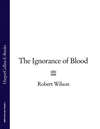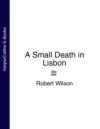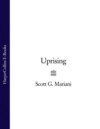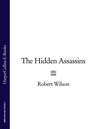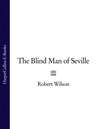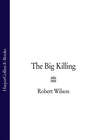Читать книгу: «The Ignorance of Blood»
ROBERT WILSON
The Ignorance of Blood

For Jane
Love is the master key that opens
the gates of happiness, of hatred,
of jealousy, and, most easily of
all, the gate of fear.
Oliver Wendell Holmes
Table of Contents
Epigraph
Chapter 1
Chapter 2
Chapter 3
Chapter 4
Chapter 5
Chapter 6
Chapter 7
Chapter 8
Chapter 9
Chapter 10
Chapter 11
Chapter 12
Chapter 13
Chapter 14
Chapter 15
Chapter 16
Chapter 17
Chapter 18
Chapter 19
Chapter 20
Chapter 21
Chapter 22
Chapter 23
Chapter 24
Chapter 25
Chapter 26
Chapter 27
Chapter 28
Chapter 29
Chapter 30
Chapter 31
Chapter 32
Acknowledgments
By the Same Author
Copyright
About the Publisher
Seville – Thursday, 14th September 2006, 19.30 hrs
The ice-cold vodka slipped down Vasili Lukyanov's throat as the traffic thundered past the lay-by on the new motorway from Algeciras to Jerez de la Frontera. The heat had started the sweat beading in his dark hair as he stood by the open boot of the Range Rover Sport. He was waiting for it to get dark, didn't want to do this last stretch into Seville in daylight. He drank, smoked, ate, and thought about his last night with Rita, the whole escapade making him silently, but grossly, oral. My God, she knew how to do it to him. He felt bad leaving her behind. He'd trained her to perfection.
The blood thumped hard in his throat as he looked down on the solid block of Samsonite luggage, jammed up against the open cool box with its chilled champagne and bottles of vodka set in blocks of ice. He tore another chunk off his bocadillo, enjoying the rip of the ham between his teeth, chugged the icy vodka. Another carnal scene from his last night with Rita came to him. Her violoncello waist, the caramel of her skin as soft as toffee in his kneading fingers. A chunk of the bread roll suddenly clogged his throat. He gasped, his eyes came out on stalks. He struggled and finally coughed. A clod of masticated bread and ham shot out over the Range Rover's roof. Steady, he thought. Don't want to choke now. Die in a lay-by with the trucks rumbling past and your future all before you.
Pepe Navajas had just finished loading the steel rods, the twenty bags of cement, and the wooden planking for making reinforced concrete pillars, which he'd stacked alongside some plumbing equipment, sanitaryware, floor and wall tiles. He was going to build an extension for his daughter and son-in-law who'd just taken delivery of twins and needed more space in their small house in Sanlúcar de Barrameda. They also had no money. So Pepe was buying everything on the cheap and, because his son-in-law was useless, he was doing the work for them over the weekends.
Pepe parked the heavily laden truck outside a restaurant in Dos Hermanas, a few kilometres before the start of the motorway heading south to Jerez de la Frontera. He'd had a beer or two with the guys from the building supplies depot. Now he was going to have an early dinner and wait for dusk. He kidded himself that the Guardia Civil didn't notice so much between dusk and night and only stopped cars later on, when people were more likely to be drunk.
Vasili turned on his mobile phone for the first time that day at just after 11 p.m. He had resisted the temptation until he was through the tollgate on the last stretch of motorway to Seville because he knew what was coming. It had been a while since he'd spent a whole day on his own and he was bursting to talk. The first call came through in a matter of seconds and, as expected, it was from Alexei, his old fellow at arms.
‘Are you alone, Vasya?’ asked Alexei.
‘Yes,’ said Vasili, his lips thick and mouth slow from the vodka.
‘I don't want you to get upset,’ said Alexei, ‘make a mistake while you're driving.’
‘Have you called to upset me?’ asked Vasili.
‘Try this,’ said Alexei. ‘Leonid's back from Moscow.’
Silence.
‘Did you hear that, Vasya? I'm not breaking up, am I? Leonid Revnik is in Marbella.’
‘He wasn't supposed to be back until next week.’
‘He came back early.’
Vasili opened the window a crack and sniffed the warm night air. It was pitch black, flat fields on either side. Only tail lights in the distance. Nothing coming the other way.
‘What did Leonid have to say?’ he asked.
‘He wanted to know where you were. I told him you'd be at the club, but they'd just come from there,’ said Alexei. ‘They'd found your office locked and Kostya on the floor unconscious.’
‘Are you on your own at the moment, Alyosha?’ asked Vasili, suspicious.
‘Leonid already knows you've crossed over to Yuri Donstov.’
‘So what is this? A warning?’
‘It's me finding out that Leonid's not lying,’ said Alexei.
Silence.
‘Something's gone missing from your office,’ said Alexei. ‘He told me that, too.’
Vasili closed the window. Sighed.
‘I'm sorry, Alyosha.’
‘Rita took a heavy beating for you. I haven't seen her, but Leonid had that animal with him – you know, the one that even the Moldovan girls won't go with.’
Vasili hit the steering wheel five times. The horn blared into the night.
‘Steady, Vasya.’
‘I'm sorry, Alyosha,’ said Vasili. ‘I'm fucking sorry. What more can I say?’
‘Well, that's something.’
‘It wasn't supposed to happen like this. Leonid wasn't supposed to be back until next week. I was going to talk to Yuri, get permission to bring you in. You were going to be part of it. You know that. I just had to …’
‘That's just the point, Vasya: I didn't know that.’
‘I couldn't tell you. You're too close, Alyosha,’ said Vasili. ‘Yuri made an offer that Leonid wouldn't have given me in a million years.’
‘But without me. You didn't want me protecting your back and … what the fuck does it matter anyway?’ said Alexei, trailing off. ‘What was that, Vasya?’
‘Nothing.’
‘I heard it. You're crying.’
Silence.
‘Well, thank fuck for that,’ said Alexei. ‘At least you're fucking sad, Vasya.’
Pepe was on the road, a little later than planned, with a few more drinks inside him than he'd intended, all because of the football: Sevilla FC winning a UEFA cup game in Athens. He'd got caught up in the post-match euphoria, eaten dinner with wine and brandy. Now he had the music on full blast and was singing along with his favourite flamenco singer, El Camarón de la Isla. What a voice. It was making him tearful.
Perhaps he was driving a little too quickly, but there wasn't much traffic and the lanes of the motorway seemed as wide and well lit as an airport runway. The music drowned out the rattling of the steel rods. He was happy, bouncing up and down on his springy seat, looking forward to seeing his daughter and the babies. His cheeks were wet with emotion.
And it was at that moment, at the very peak of his happiness, that the tyre beneath him blew. It was a noise loud enough to penetrate the cab. A muffled thump like distant heavy ordnance, followed by the crack and rip of the tyre peeling off the rim and slapping around the wheel arch. His stomach sank with the cab as it listed to the left. In the break in the music he heard the pieces of tyre smacking down the side of the truck, metal screeching on the tarmac. His headlights, which had been locked steady between the lanes, slewed across the straight white flashes, and although everything was slowing down so that no detail escaped his wide-open eyes, some deep instinct was telling him that he was going dangerously fast, in a cab with a very heavy load behind it.
Fear sliced through his innards but the alcohol in his veins only gave him the presence of mind to grip the steering wheel, which had powers of its own. El Camarón started up again just before Pepe's truck smashed into the barrier of the central reservation. Only with that abrupt halt did he realize the full extent of his forward momentum as he was catapulted through windscreen glass into the warm night air. Over the agonized voice of El Camarón he heard a noise that was the last thing his befuddled brain managed to compute. Steel rods, now loose, taking off like a battery of launched spears into a tunnel of approaching light.
And the reason Vasili was crying was that he'd just undergone that extraordinary human facility for compressing a life into a compact emotional experience. Seven times in six years of service in Afghanistan Alexei had protected his back. And now, having survived all those years fighting the Pashtoons, Alexei was going to get shot in the back of the head by one of his own in a forest on the Costa del Sol, for no other reason than that he was Vasili Lukyanov's best fucking friend.
‘Tell Leonid –’ he started, and stopped when he sensed something flashing towards him, a strange agitation in the air. ‘What the fuck …?’
The steel rods, their tail ends quivering with expectation, entered the cone of light, as if attracted to him at its apex.
They hit with explosive force.
Tyres smeared their rubber on to the dark road, thumped against an unseen obstruction and the Range Rover took off into the abysmal black of the fields beyond. There was a momentary silence.
‘Vasya?’
1
Falcón's house, Calle Bailén, Seville – Friday, 15th September 2006, 03.00 hrs
The phone trembled under the warm breath of the brutal night.
‘Diga,’ said Falcón, who was sitting up in bed with a file from one of the hundreds concerning the 6th June Seville bombing resting on his knees.
‘You're awake, Javier,’ said his boss, Comisario Elvira.
‘I do my best thinking at this time in the morning,’ said Falcón.
‘I thought most people our age just worried about debt and death.’
‘I have no debts … not financial ones anyway.’
‘Somebody has just woken me up to talk about death … about a death,’ said Elvira.
‘And why were you called, rather than me?’
‘At some time before eleven thirty-five, which was when it was reported, there was a car accident at kilometre thirty-eight on the northbound motorway from Jerez to Seville. In fact, on both sides of the motorway, but the deaths have occurred on the northbound side. I'm told it's very nasty and I need you to go out there.’
‘Something that the Guardia Civil can't handle?’ said Falcón, glancing at his clock. ‘They've taken their time.’
‘It's complicated. They originally thought there was just one vehicle, a truck, which had crashed into the central reservation barriers and shed its load. It took them a while to realize there was another vehicle, beyond some pine trees down a bank on the other side of the motorway.’
‘Still no reason to involve the Homicide squad.’
‘The driver of the northbound vehicle has been identified as Vasili Lukyanov, a Russian national. When they finally got round to looking in the boot of his car they discovered a suitcase had split open and there was a lot of money … I mean a hell of a lot of money. I understand we're talking about millions of euros, Javier. So, I want a full forensic examination of the vehicle and, although it's clearly an accident, I want you to investigate it as if it was a murder. There could be implications for other investigations going on around the country. And, most important, I want that money fully accounted for and made safe. I'll get a security van sent up there as soon as I can raise someone.’
‘I assume we're talking about a Russian mafia gang member,’ said Falcón.
‘We are. I've already spoken to the Organized Crime Intelligence Centre. They've confirmed it. Area of expertise – prostitution. Area of operation – Costa del Sol. And I've contacted Inspector Jefe Casado – you remember him? The guy from the GRECO, the Organized Crime Response Squad in the Costa del Sol.’
‘The one who gave us a presentation back in July about setting up a GRECO in Seville to handle the mafia activity here,’ said Falcón. ‘And nothing's happened.’
‘There's been a delay.’
‘Why can't he handle this?’
‘That's the delay, he's in Marbella running about twenty investigations down there,’ said Elvira. ‘And anyway, he hasn't started work on the situation in Seville yet.’
‘He'll know more than we do and he'll have the intelligence on Lukyanov's Costa del Sol activity.’
‘Exactly, which is why he's sending us one of his own men, Vicente Cortés, who'll bring someone from the Organized Crime Intelligence Centre with him.’
‘Well, I'm awake, so I might as well go,’ said Falcón, and hung up.
Shaving was the usual morning trial, facing the full prosecution of his stubbled face. Same old story with a few more lines. The mind engraving its doubts and fears. They'd all told him that the ultimate solution to the Seville bombing was not expected of him. He knew it himself. He'd looked at the other inspector jefes who did their ugly work in the world of violence and left it in the office. But that was not for him, not this time. He ran a hand over his short-cropped hair. The life-changing events of the last five years had turned the salt and pepper to steel grey and he didn't dye it, unlike the other inspector jefes. The light and the remnants of his summer tan brought out the amber in his brown eyes. He grimaced as the razor made lanes through the foam.
Dressed in a navy blue polo shirt and chinos, he left the bedroom, rested his hands on the railing around the gallery and leaned out. No visible stars. He looked down on to the central patio of the massive eighteenth-century house he'd inherited from his disgraced father, the artist, Francisco Falcón. The pillars and arches were roughly sketched in by a solitary light whose sulphurous glow lit the bronze boy tiptoeing across the fountain and brought up the far recesses behind the pillars of the colonnade, where a plant, dried to a rustling husk, still lurked in a corner. He must throw that out, he thought for the hundredth time. He'd asked his housekeeper, Encarnación, to get it done months ago, but she had her strange attachments: her mobile Virgins, her Stations of the Cross, that wretched plant.
Toast with olive oil. A small, strong coffee. He got into his car with the caffeine sharpening his reactions. He drove through the stifling, uneasy city, which still seemed to be panting from the uproar of the day, its tarmac ruptured into thick biscuit, cobbles piled on pavements, roads ploughed up to reveal vital inner workings, machinery poised to strike. Every street, it seemed, was fenced off and taped, bollarded to kingdom come. The air reeked of Roman dust uncaked from subterranean ruins. How could anybody settle down in this tumult of reconstruction? But, of course, everything had its purpose. This was nothing to do with the bombing of a few months ago but the mayoral elections which were to take place in early 2007. So the population had to feel the torment of the incumbent's beneficence.
It was fast work getting out of the city at this time in the morning, still dark, four hours to go before sunrise. He was across the river and out on the ring road in minutes, flying down the motorway towards Jerez de la Frontera inside a quarter of an hour. It wasn't long before he saw the lights: the surgical halogen, the queasy blue, the unnerving red, the slow, revolving, sickly yellow. He pulled up on the hard shoulder behind a huge tow truck. Disembodied luminous jackets floated in the dark. There was hardly any traffic. He crossed the motorway and entered the noise of the generator powering the lights that brutally illuminated the scene. There were three Nissan 4×4s in the white and green of the Guardia Civil, two motorbikes, a red fire engine, a Day-Glo green ambulance, another smaller tow truck, halogen lighting up on stalks, wiring all around, a spray of glass diamonds from the crashed truck's windscreen swept on to the hard shoulder.
The firemen had their cutting tools ready, but were waiting for the law men to show. As Falcón arrived more cars pulled up on the other side. He introduced himself, as did the duty judge, the forensics, Jorge and Felipe, and the médico forense. The Guardia Civil talked them through the accident.
‘The Range Rover was driving from Jerez to Seville in the fast lane at an estimated speed of 140 kilometres per hour. The truck was travelling from Seville to Jerez in the nearside lane when the front left tyre burst. The truck swerved across to the fast lane and hit the barriers of the central reservation at approximately 110 kilometres per hour. The impact sent the driver through the windscreen, dislodged a load of steel rods, wooden planking and metal tubing, which shot over the cab roof and flew into the fast lane of the oncoming traffic. The driver of the truck cleared the central reservation and the fast lane and came to rest by the crash barrier on the hard shoulder. The Range Rover was hit by two steel rods thirty metres beyond where the truck had hit the barriers. The first went through the windscreen, speared the driver through the chest and continued through the front seat, the rear seat and the floor of the vehicle, missing the fuel tank by millimetres. The second rod went through the rear window and into the boot. This rod seems to have ripped open the suitcase, exposing the money. The driver of the Range Rover died on impact, lost control of the vehicle, which must have hit some of the truck's shed load, giving the car sufficient lift so that it cleared the crash barriers, smashed through the pine trees and disappeared down the bank, into the fields.
‘If that steel rod hit him with a combined velocity of 250 kilometres per hour,’ said the médico forense, ‘I'd be surprised if there was anything left of him.’
‘What is left is not a pretty sight,’ said the Guardia Civil.
‘I'll take a look,’ said the médico forense, ‘then you can start cutting him out of there.’
Felipe and Jorge completed their initial inspection of the scene and took their photographs. They joined Falcón while the médico forense finished his work.
‘What the fuck are we doing here?’ asked Felipe, yawning wider than a dog. ‘It's not murder.’
‘He's Russian mafia and there's a lot of money here,’ said Falcón. ‘Any evidence we gather might be usable in a future conviction. Fingerprints on the money and suitcase, mobile phone, address book; there might be a laptop in there…’
‘There's a briefcase on the back seat, which wasn't touched by the steel rods,’ said the Guardia Civil. ‘And there's a cool box in the boot. We haven't opened either of them.’
‘This is why we need an Organized Crime Response Squad in Seville,’ said Jorge.
‘We're running this for the moment. They're sending someone up from the Costa del Sol GRECO and an intelligence guy from CICO,’ said Falcón. ‘Let's take a look at this money. Elvira called me on the way to say he's got Prosegur to send a van out.’
The Guardia Civil opened the boot. There was suddenly a crowd.
‘Joder,’ said one of the motorbike cops.
The visible money was in used notes and bound in packs of €100- and €50-denomination notes. Some of the packs had burst open on impact from the steel rod, but there was no loose money outside the vehicle.
‘Let's have some room around here,’ said Falcón. ‘Glove up. Only the forensics and I will touch this money. Jorge, bring a couple of bin liners over, one for each denomination.’
They counted out the packs of money, avid eyes looking on. At the bottom of the suitcase were several layers of €200-denomination notes and below them two layers of €500 notes. Jorge went to get two more bin liners. Falcón made his calculations.
‘Not counting this loose money, we're looking at seven million, six hundred and fifty thousand euros.’
‘That's got to be drug money,’ said the Guardia Civil.
‘More likely people-trafficking and prostitution,’ said Falcón, who was calling Comisario Elvira.
As he gave his report the Prosegur van pulled up in front of the last Nissan 4×4. Two helmeted guys lifted a metal trunk out of the back. Falcón hung up. Felipe had taped up the packs of money into tight black blocks and was marking up the bin liners with white stick-on labels. They put the four blocks into the trunk, which was locked with two keys, one given to Falcón, who signed for it.
The money moved off. The scene relaxed.
Falcón lifted out the cool box, opened it. Krug champagne and melting blocks of ice around bottles of Stolichnaya.
‘I suppose eight million euros would merit a bit of a celebration,’ said the Guardia Civil. ‘We could have all retired on that lot.’
While one of the fire brigade teams winched the steel rods out of the car, the other reached through the window, cut away the air bag and started on the door frames with an oxyacetylene torch. Vasili Lukyanov's body was taken out in pieces and laid on an opened body bag on a stretcher. His arms, shoulders and head were intact, as were his legs, hips and lower torso. The rest had vaporized. His face was deeply furrowed with red streaks where the windscreen glass had shredded the skin. His left eye had exploded, part of his scalp was missing and his right ear was a mangled flap of gristle. He grinned horribly with lips partially torn away and some teeth ripped from their gums. His lap was stained dark with his blood. His shoes were brand new, the soles hardly scuffed.
A young fireman vomited into the oleanders by the side of the road. The paramedics tucked Lukyanov into the body bag and zipped it up.
‘Poor fucker,’ said Felipe, bagging the suitcase. ‘Eight million in the boot and you get speared by a flying steel rod.’
‘You're more likely to win the lottery,’ said Jorge, taking a look at the briefcase's combination lock, trying to open it, unsuccessfully, and then bagging it. ‘Should have bought a ticket and stayed at home.’
‘Here we go,’ said Felipe, who'd just opened the glove compartment. ‘One nine-millimetre Glock and a spare clip for our friendly Russian comrade.’
He sorted through the car papers and insurance documents, while Jorge worked through a selection of motorway receipts.
‘Something to brighten up his day,’ said Jorge, shaking a plastic sachet of white powder which had fallen out of the receipts.
‘And something to dull someone else's day,’ said Felipe, pulling out a cosh from under the seat. ‘There's blood and hair still stuck to it.’
‘He's got GPS.’
‘Anyone got the keys?’ asked Felipe, over his shoulder.
The Guardia Civil handed him the keys, they turned on the electrics. Felipe played with the GPS.
‘He was coming from Estepona, heading for Calle Garlopa in Seville Este.’
‘That narrows it down to a few thousand apartments,’ said Falcón.
‘At least it didn't say Town Hall, Plaza Nueva, Seville,’ said Jorge.
Everybody laughed and went quiet, as if it might not be so far from the truth.
Another hour and they'd been through the rest of the car. They crossed over the motorway with the evidence bags, loaded them into the back of their van and drove off. Falcón oversaw the loading of the Range Rover on to the breakdown truck.
First light creaked open at the hinge of the world as he walked back up to where the truck had hit the barrier, whose galvanized metal ballooned. The truck had been pulled away and was now on the hard shoulder, front jacked up behind the tow truck. He called Elvira to tell him that the Prosegur van had left and to make sure someone was at the Jefatura to receive the money. The forensics still needed to go over it before it could be sent to the bank.
‘What else?’ asked Elvira.
‘A locked briefcase, a handgun, a bloody cosh, Krug champagne, vodka and a few grams of coke,’ said Falcón. ‘A violent party animal was Vasili Lukyanov.’
‘Animal is the word,’ said Elvira. ‘He was arrested back in June on suspicion of rape of a sixteen-year-old girl from Málaga.’
‘And he got off?’
‘The charges were dropped on him and another brute called Nikita Sokolov and, having seen the photos of the girl, it's nothing short of a miracle,’ said Elvira. ‘But then I called Málaga and it seems that the girl and her parents have moved into a brand-new, four-bedroomed house in a development outside Nerja and her father has just opened a restaurant in the town … which is where his daughter now works. This new world makes me feel old, Javier.’
‘There are a lot of well-fed people out there who are still hungry,’ said Falcón. ‘You should have seen the reaction to all that money in the back of the Russian's car.’
‘You got it all, though, didn't you?’
‘Who knows if a few packs were lifted before I arrived?’
‘I'll call you when Vicente Cortés gets here and we'll have a meeting in my office,’ said Elvira. ‘Maybe you should go home and get some sleep.’
They came for Alexei just before dawn and couldn't raise him. One of them had to scramble down the side of the small villa and get into the garden over a low wall. He broke the lock on the sliding window, let himself in and opened the front door for his friend, who took out his Stechkin APS handgun, which he'd hung on to since leaving the KGB back in the early 1990s.
They went upstairs. He was in the bedroom, wound up in a sheet on the floor with an empty bottle of whisky next to him, dead to the world. They kicked him awake. He came to, moaning.
They stuck him in the shower and turned on the water, cold. Alexei grunted as if they were still kicking him. The muscles trembled under his tattoos. They kept the water trained on him for a couple of minutes and let him out. He shaved with the two men in the mirror and took some aspirin, swilled down with tap water. They walked him into the bedroom and watched him while he got dressed in his Sunday best. The ex-KGB man sat on the bed with his Stechkin APS dangling between his knees.
They went downstairs and out into the heat. The sun was just up, the sea was blue, there was barely any movement, just birds. They got into the car and drove down the hill.
Ten minutes later they were in the club, sitting in Vasili Lukyanov's office, but with Leonid Revnik behind the desk smoking an H. Upmann Coronas Junior cigar. He had short grey hair, cut en brosse with a sharp widow's peak, big shoulders and chest under a very expensive white shirt from Jermyn Street.
‘Did you speak to him last night?’ asked Revnik.
‘To Vasili? Yes, I got through eventually,’ said Alexei.
‘Where was he?’
‘On the road to Seville. I don't know where.’
‘What did he have to say?’ asked Revnik.
‘That Yuri Donstov had made him an offer that you wouldn't have given him in a million years.’
‘He's right there,’ said Revnik. ‘What else?’
Alexei shrugged. Revnik glanced up. A hard fist clubbed Alexei in the side of the head, knocked him and the chair over.
‘What else?’ said Revnik.
They hefted Alexei and the chair back to vertical. A lump was already up on the side of his face.
‘“What the fuck,”’ said Alexei. ‘He had an accident.’
That had Revnik's attention.
‘Tell me.’
‘We were talking and he suddenly said: “What the fuck is this …” then BANG! and the sound of tyres screeching, a thump, a crash and then it all went dead.’
Revnik hit the desk.
‘Why the fuck didn't you tell us that last night?’
‘I was drunk. I passed out.’
‘You know what that means?’ said Revnik to no one in particular, but pointing across the room. ‘It means that what was in there is now in the hands of the police.’
They looked at the empty safe.
‘Take him away,’ said Revnik.
They took him back out to the car, drove up into the hills. The smell of pine was very strong after the cool of the night. They walked him into the trees and the ex-KGB man finally got to use his Stechkin APS.
Начислим
+34
Покупайте книги и получайте бонусы в Литрес, Читай-городе и Буквоеде.
Участвовать в бонусной программе
